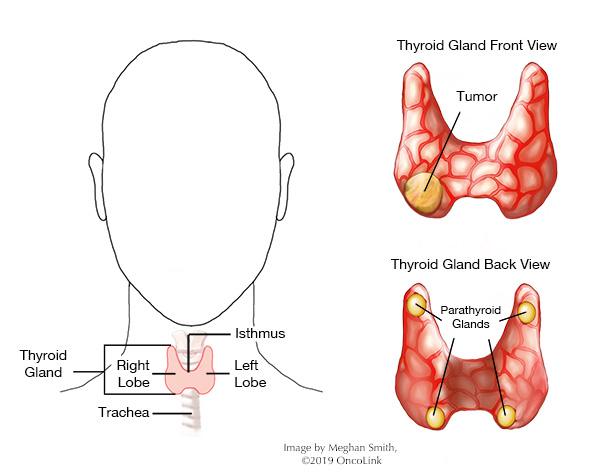
Thyroid Cancer: The Basics
Thyroid cancer is caused by cells in your thyroid gland growing out of control. Your thyroid is in your neck, around your throat. The thyroid gland makes hormones that control your growth and development. As the number of cells grows, they form a tumor. There are four main types of thyroid cancer:
- Papillary Carcinoma.
- Follicular Carcinoma.
- Medullary Carcinoma.
- Undifferentiated.
Thyroid cancer that has spread from the thyroid to some other part of the body is called metastatic cancer.
Risks
It is not known what causes thyroid cancer. Some causes could be:
- Not eating enough iodine in your foods.
- Radiation to the neck at a young age.
- Family members who had thyroid cancer.
- Changes to your genes.
Screening
Your healthcare provider will look at and feel your neck. Some thyroid cancers are also found on tests like ultrasound and CT scans.
Signs of Thyroid Cancer
The most common sign of thyroid cancer is a bump (nodule). Larger thyroid nodules can cause:
- Voice changes.
- A feeling of tightness or pressure on parts of your throat.
- Feeling short of breath.
- Painful swallowing or having trouble swallowing.
- Neck pain.
Diagnosis of Thyroid Cancer
When your healthcare providers think you may have thyroid cancer, you will have some tests done. Your provider will also look at your body and check your lymph nodes to see if they are larger than they should be. Some of the tests used are:
- Blood tests to check how your thyroid is working.
- Ultrasound.
- If an ultrasound finds the nodule may be cancer, a fine needle aspiration (FNA) biopsy will be done.
A pathology report shows the results of these tests and is sent to your healthcare provider. This report is part of planning your treatment. You can ask for a copy of your report for your records.
Staging Thyroid Cancer
To help pick your treatment, thyroid cancer is "staged." This stage is based on:
- The size of the tumor and where it is.
- If cancer cells are found in the lymph nodes.
- If cancer cells are found in other parts of the body.
- Any tumor that may be left after surgery.
Stages range from stage I (one; smallest, most confined tumors) to stage IV (four; tumors that have spread to other parts of the body, also called metastatic cancer). The stage and type of thyroid cancer will guide your treatment plan.
Treatment
Often, these treatments are used:
- Surgery:
- Total thyroidectomy (the whole thyroid is removed).
- Near-total thyroidectomy (a small part of the thyroid gland and parathyroid glands are left in the body).
- Lobectomy (a single lobe of the thyroid gland is removed).
- Lymph nodes may be removed during surgery if the cancer has spread to them or to test for cancer in them.
- Supplemental Thyroid Hormone Therapy: Thyroid hormone pills are given after surgery to patients who had a near-total or total thyroidectomy. It is used to replace hormones no longer being made by the missing thyroid. It can also keep any leftover thyroid cancer from growing back.
- Radioactive Iodine Therapy can be used to kill leftover thyroid tissue and cancer cells. The radioactive iodine is taken up by the thyroid cells, killing them and any cancer in them.
- Radiation Therapy is used in some types of thyroid cancer and for people at high risk of cancer coming back.
- Chemotherapy is used to treat thyroid cancer that has spread to other parts of the body.
This article is an introduction to thyroid cancer. You can learn more about thyroid cancer diagnosis and treatment by using the links below.
Thyroid Cancer: Staging and Treatment
Hürthle Cell Carcinoma Staging and Treatment
Surgical Procedures: Surgery and Staging for Thyroid Cancers
OncoLink is designed for educational purposes only and is not engaged in rendering medical advice or professional services. The information provided through OncoLink should not be used for diagnosing or treating a health problem or a disease. It is not a substitute for professional care. If you have or suspect you may have a health problem or have questions or concerns about the medication that you have been prescribed, you should consult your health care provider.
Information Provided By: www.oncolink.org | © 2025 Trustees of The University of Pennsylvania
